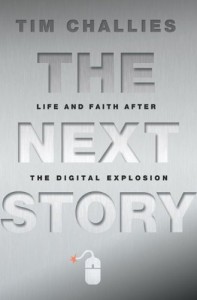All this month I’ve been hunkered down doing research for our new “Digital Kids Initiative” here at CPYU. It’s our attempt to think Christianly about this brave new digital world that didn’t exist just a few short years ago. What is it? Where did it come from? How are we living in it? What is it doing to us? What should we be doing with it? And, how should our faith inform our journey across this new frontier? These are the questions we’ve been working to answer.
I’m currently in research mode on this project. . . plowing through a pile of books and other documents. My book stack was interrupted the other day with the arrival of Tim Challies’ new book, “The Next Story: Life and Faith After the Digital Explosion.” I’ve come to appreciate Tim’s heart, mind, and ability to think deeply and theologically on matters of faith and life. Tim’s the kind of young thinker who is choosing to land and anchor himself in all the right places. What’s resulting is some very significant thought and guidance that the church should heed. Tim – and I know he’s not alone in this – is a breath of fresh air. There are a growing number of young Christian thinkers like Tim.
So, before putting Tim’s in the stack, I open it up and start reading. My heart leaps and I smile. This is what I’ve been looking for. This is the kind of stuff we’ve been pushing for here at CPYU since the get-go. You know, a thoughtful cultural critique that brings together good theology, the best of the social sciences, and deep thinking that looks ahead to where the road we’re happily traveling now just might lead. The book never went in the stack.
While I think it’s important to never respond to, critique, or recommend a book until you’ve given it a careful read. . . well, that’s a rule I’m going to break in this case. All I had to do was read a couple of initial pages and I knew that this would be a book I would recommend to everyone, and require whenever I’m in the classroom.
The Introduction had me hooked. Tim describes how his love for all gadgets digital came under the gaze of his own critical and watchful eye, forcing him to ask questions like “Am I giving up control of my life? It it possible that these technologies are changing me? Am I becoming a tool of the very tools that are supposed to serve me?” Then, he goes on to suggest that Christians today are experience rich and theology poor. While we are well-versed in the experience of using technology, we don’t have the theoretical or theological tools to make sense of the consequences of our use of technology. That’s exactly the kind of gap we’ve been working to bridge here at CPYU in a number of areas. Tim goes on to work out what the overlap between theory, theology, and experience should look like for the follower of Jesus. This is really, really good stuff. Plus, it’s accessible.
I’ll finish reading “The Next Story” later today. As I’ve been reading, I find myself continually stirred and excited. If you’re a parent or youth worker you need to read this book. As you read, think seriously about passing this information on to your kids. No. . . don’t think about it. Do it.

Thanks for the recommendation
Walt, I am not sure if your tech research is leading you to study the effects on college students, but i would love to see what you find. As a higher education professional it seems that college students who are obsessed with video games, facebook, iPhones etc. are also less likely to be happy in school, have solid relationships, and seem more likely to be addicted to or regularly view pornography. Has your research led you in that direction?